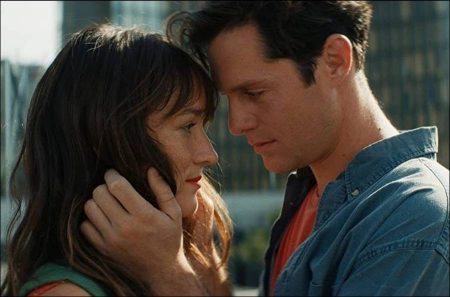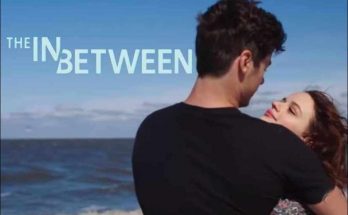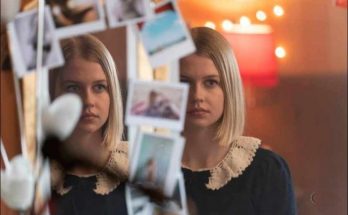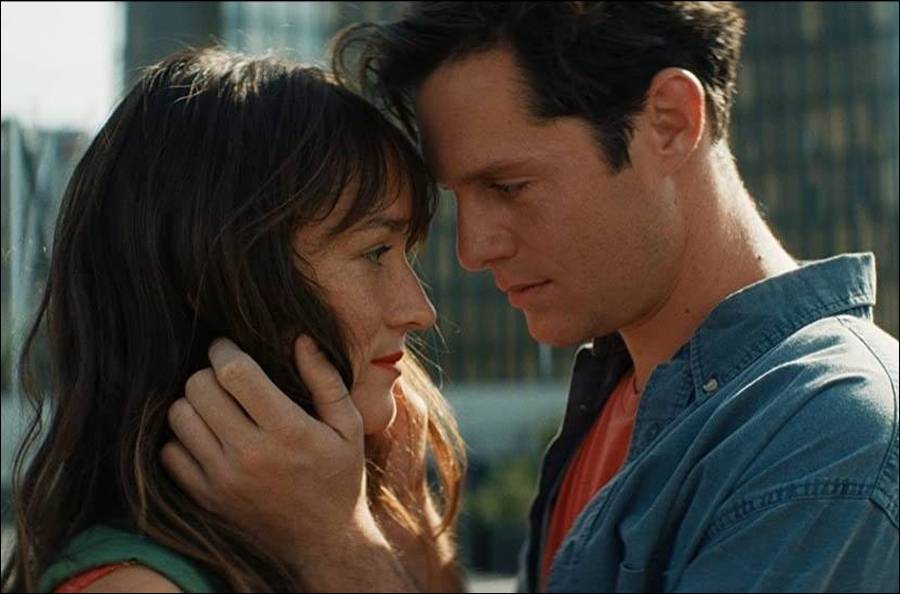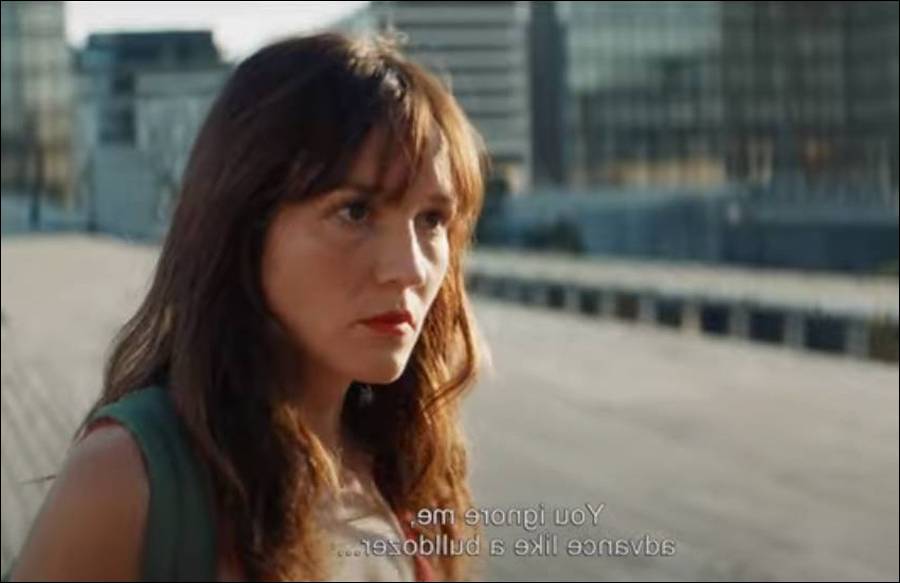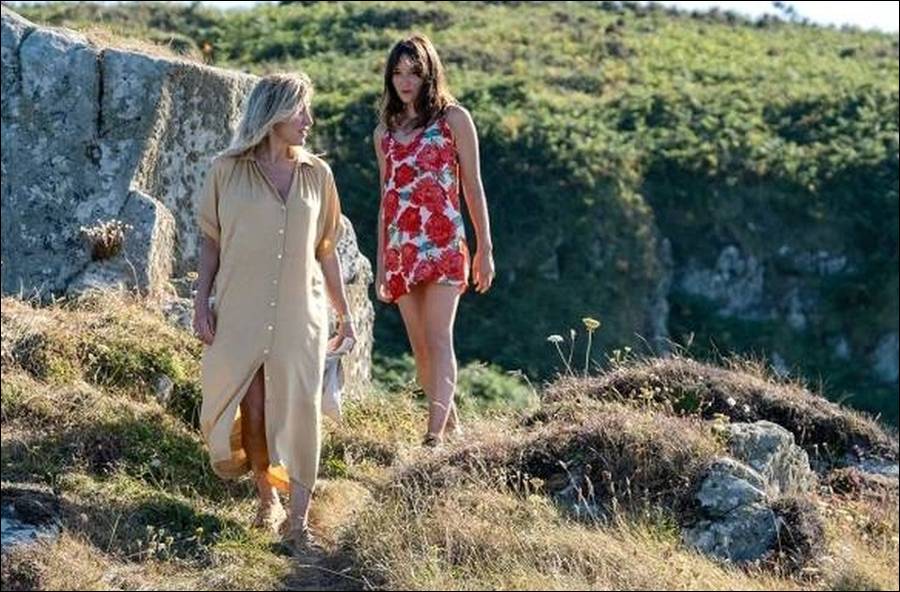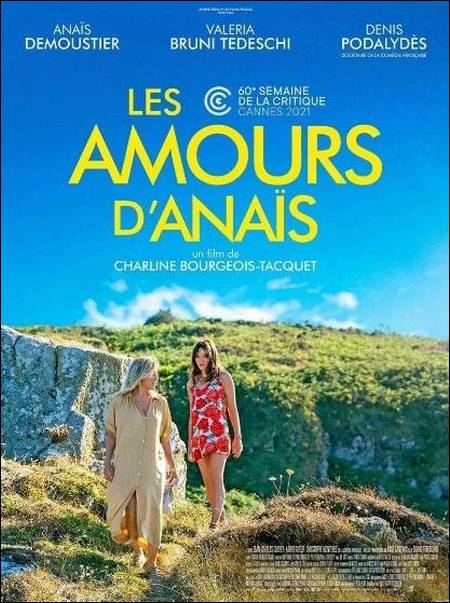Anaïs in Love opens with Anaïs’ life in shambles. Her boyfriend Raoul (Christophe Montenez) has moved out, and Anaïs worries out loud constantly—to people who know her, people who don’t—that she might not be capable of loving someone.
Raoul’s nickname for her is, appropriately, “Big Tractor,” and he says to her at one point: “You don’t realize what human interaction is.” He’s not wrong! Anaïs’ mother (Anne Canovas) has cancer, and it’s bad. Anaïs’ dissertation—on passion in 17th-century literature—is at a total standstill. It’s hard to picture Anaïs going to the library, sitting quietly, reading a book, taking notes. Her thesis mentor gives her organizational tasks, and then is (understandably) annoyed when Anaïs blows it all off.
At a party one night, she meets Daniel (Denis Podalydès), a man old enough to be her father, and married to a successful writer. The two start an affair, with very little fanfare (or feelings of guilt) but it’s an affair with some quirks. The sex (by the looks of it, anyway) isn’t great. In fact, there’s barely any passion at all.
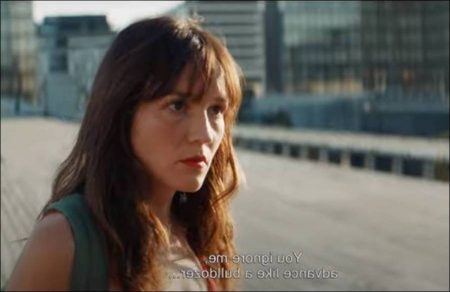
The situation gets more complicated (and French) when Anaïs sees a televised interview with Daniel’s wife Emilie (Valeria Bruni Tedeschi). Anaïs reads Emilie’s books, is drawn to the writing, and so she takes the next natural step: she launches a mild stalking campaign. Everywhere Emilie looks, there is Anaïs: at book readings, on the sidewalk, at a literary conference (where Anaïs has to do odd jobs around the property in order to be allowed to even attend).
Anaïs in Love is a 2021 French comedy film directed by Charline Bourgeois-Tacquet. The film was shown in the International Critics’ Week section at the 2021 Cannes Film Festival. The film was shot on the Brittany peninnsula and in the city of Nantes in France. It was released on April 29, 2022 in the United States by Magnolia Pictures.
Film Review for Anaïs in Love
Anaïs, the fanciful Parisian protagonist of Charline Bourgeois-Tacquet’s seductive debut feature Anaïs in Love, is restless, scatterbrained and always on the move. Because of her claustrophobia, taking the metro is out of the question (elevators, too); she prefers to zip through the city on her bike.
When we first meet her, Anaïs is late for a meeting with her landlord. A brisk piano tune accompanies the young woman’s race from the florist to her apartment, her backpack bopping up and down as she tightly grips a bouquet.
It’s the perfect introduction to this winsome, sometimes exhausting woman played by Anaïs Demoustier. The energy of the opening sequence indeed is sustained as we follow the character’s tussles with desire. Bourgeois-Tacquet’s film is a merry-go-round, a kinetic portrait of a young woman stumbling out of love, falling into it, letting it go and picking it back up.
Each romance presents an opportunity for growth, but Anaïs in Love is not about coming of age in any neat, linear sense. The film is preoccupied — obsessed, really — with the process of growing into oneself, which is different from just getting older. Anaïs’ journey contains moments of exhilarating momentum and then, just as quickly, depressing inertia. The film, at times, feels crazed and slightly random — just like our protagonist.
The contours of Anaïs’ personality, on display through her brief, rattling conversation with her landlord, suggest a woman fixated on being interesting. As the landlord impatiently lectures her on installing a smoke detector and paying her overdue rent, Anaïs shuffles around the apartment, changing for a party and confessing how things between her and her partner Raoul (Christophe Montenez) aren’t working out. The problem, Anaïs tries to explain while putting on a new dress, is that she found domesticity grating, boring, not for her.
There’s some truth to that statement, and other pseudo-profound ones Anaïs utters throughout the film. She craves passion but seems too distracted to nurture it. She longs for mystery, difference, anything! Daniel (Denis Podalydès), a man nearly her father’s age with whom she starts a steady and undramatic affair, promises that, at first. But that relationship runs into its own roadblocks when Daniel realizes he doesn’t want to change his life. He doesn’t want to have an affair with Anaïs, who he thinks will inevitably leave him, nor does he want to totally combust the life he’s built with his partner, Emilie (a brilliant Valeria Bruni Tedeschi), a famous writer.
Anaïs, who, it becomes clear, is not used to being rejected, does not take the breakup well. She becomes fixated on Emilie, trying to understand why Daniel would choose her instead. She reads Emilie’s books and watches her interviews — familiar actions to anyone wrestling through the knotty mess of heartbreak. But the process comes with its own surprises, and what begins as curiosity morphs into fascination, attraction, lust.
The story at the center of Anais in Love is one of seduction. It’s about finding yourself so enthralled by another person, so seen, that being in their presence becomes the only goal. Although Anaïs has other responsibilities (she needs to turn in her thesis and care for her mother, whose cancer has returned), she eschews them all to chase Emilie.
The two run into each other on the street, an encounter that hints at Anaïs’ attraction. Understanding dawns on her at that moment. Of course Daniel prefers Emilie, a beautiful woman whose books leave Anaïs vulnerable and inspired. “I love your style. It’s dazzling,” Anaïs says to Emilie at a busy intersection. “We seem close emotionally.”
Is Anaïs’ love for Emilie real or is it based on projection? Does it ultimately matter? Anaïs in Love pokes and prods at these questions, putting the two lovers in encounters that test various theories. The layers of Anaïs and Emilie’s courtship are familiar, but in Demoustier and Tedeschi’s hands they feel different, more ravishing. These are two people trying to figure each other out, Emilie initially skeptical of Anaïs’ interest and Anaïs hungry to learn more about this older, stoic woman.
Their encounters — even when brief — are electrifying; they capture the thrill of falling in love, which is a shadow process in self-discovery. In Emilie’s presence, Anaïs is a different version of herself, more attentive, less scattered. For Emilie, Anaïs ignites a dormant passion, an energy that allows her to write feverishly and finish her book. DP Noé Bach’s sleepy, golden-hued palette becomes effervescent during scenes of the two women’s horny flirtation.
The pair eventually act on their desires, consummating their love on a glittering beach one lazy summer afternoon. It’s a dream for them both, but it doesn’t last. As in her previous relationships, Anaïs, courageous in her pursuit of pleasure, comes up against limitations, projections and practicalities. A longing to love can only take her so far before reality punctures the bubble. But Anaïs in Love isn’t particularly interested in crushing our protagonist, who, by the film’s end, begins to see the power of her quirks. It’s really about her journey — one that I would, without hesitation, watch again and again.
Anaïs in Love (2022)
Directed by: Charline Bourgeois-Tacquet
Starring: Anaïs Demoustier, Valeria Bruni Tedeschi, Jean-Charles Clichet, Denis Podalydès, Christophe Montenez, Anne Canovas, Christophe Montenez, Marie-Armelle Deguy, Sabrina Delarue
Screenplay by: Charline Bourgeois-Tacquet
Production Design by: Pascale Consigny
Cinematography by: Noé Bach
Film Editing by: Chantal Hymans
Art Direction by: Sebastien Casanova, Arnaud Dias
Music by: Nicola Piovani
MPAA Rating: None.
Distributed by: Magnolia Pictures
Release Date: July 10, 2021 (Cannes), April 29, 2022 (United States)
Views: 118
